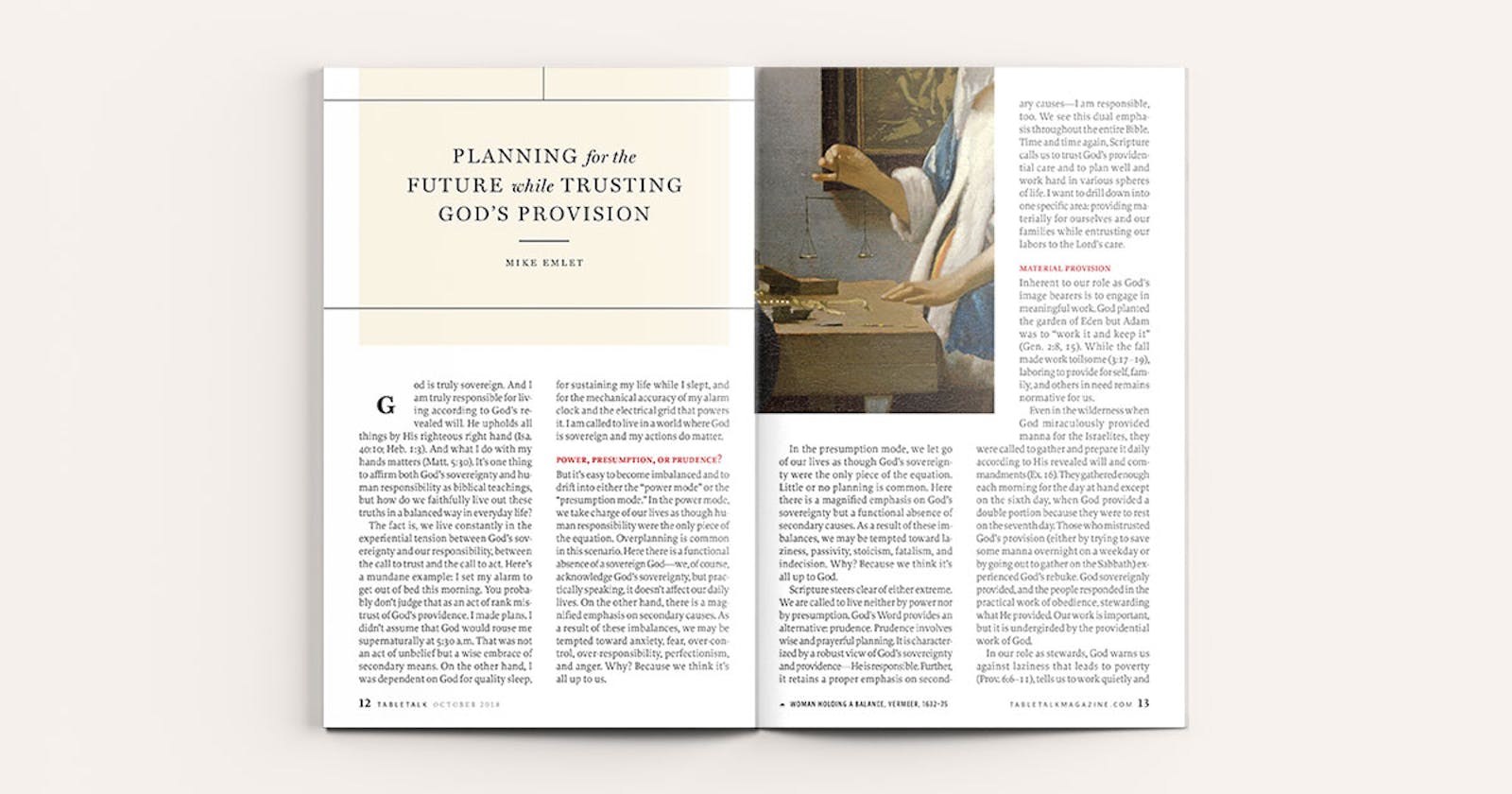
Request your free, three-month trial to Tabletalk magazine. You’ll receive the print issue monthly and gain immediate digital access to decades of archives. This trial is risk-free. No credit card required.
Try Tabletalk NowAlready receive Tabletalk magazine every month?
Verify your email address to gain unlimited access.
God is truly sovereign. And I am truly responsible for living according to God’s revealed will. He upholds all things by His righteous right hand (Isa. 40:10; Heb. 1:3). And what I do with my hands matters (Matt. 5:30). It’s one thing to affirm both God’s sovereignty and human responsibility as biblical teachings, but how do we faithfully live out these truths in a balanced way in everyday life?
The fact is, we live constantly in the experiential tension between God’s sovereignty and our responsibility, between the call to trust and the call to act. Here’s a mundane example: I set my alarm to get out of bed this morning. You probably don’t judge that as an act of rank mistrust of God’s providence. I made plans. I didn’t assume that God would rouse me supernaturally at 5:30 a.m. That was not an act of unbelief but a wise embrace of secondary means. On the other hand, I was dependent on God for quality sleep, for sustaining my life while I slept, and for the mechanical accuracy of my alarm clock and the electrical grid that powers it. I am called to live in a world where God is sovereign and my actions do matter.
Power, Presumption, or Prudence?
But it’s easy to become imbalanced and to drift into either the “power mode” or the “presumption mode.” In the power mode, we take charge of our lives as though human responsibility were the only piece of the equation. Overplanning is common in this scenario. Here there is a functional absence of a sovereign God—we, of course, acknowledge God’s sovereignty, but practically speaking, it doesn’t affect our daily lives. On the other hand, there is a magnified emphasis on secondary causes. As a result of these imbalances, we may be tempted toward anxiety, fear, over-control, over-responsibility, perfectionism, and anger. Why? Because we think it’s all up to us.
In the presumption mode, we let go of our lives as though God’s sovereignty were the only piece of the equation. Little or no planning is common. Here there is a magnified emphasis on God’s sovereignty but a functional absence of secondary causes. As a result of these imbalances, we may be tempted toward laziness, passivity, stoicism, fatalism, and indecision. Why? Because we think it’s all up to God.
Scripture steers clear of either extreme. We are called to live neither by power nor by presumption. God’s Word provides an alternative: prudence. Prudence involves wise and prayerful planning. It is characterized by a robust view of God’s sovereignty and providence—He is responsible. Further, it retains a proper emphasis on secondary causes—I am responsible, too. We see this dual emphasis throughout the entire Bible. Time and time again, Scripture calls us to trust God’s providential care and to plan well and work hard in various spheres of life. I want to drill down into one specific area: providing materially for ourselves and our families while entrusting our labors to the Lord’s care.
Material Provision
Inherent to our role as God’s image bearers is to engage in meaningful work. God planted the garden of Eden but Adam was to “work it and keep it” (Gen. 2:8, 15). While the fall made work toilsome (3:17–19), laboring to provide for self, family, and others in need remains normative for us.
Even in the wilderness when God miraculously provided manna for the Israelites, they were called to gather and prepare it daily according to His revealed will and commandments (Ex. 16). They gathered enough each morning for the day at hand except on the sixth day, when God provided a double portion because they were to rest on the seventh day. Those who mistrusted God’s provision (either by trying to save some manna overnight on a weekday or by going out to gather on the Sabbath) experienced God’s rebuke. God sovereignly provided, and the people responded in the practical work of obedience, stewarding what He provided. Our work is important, but it is undergirded by the providential work of God.
In our role as stewards, God warns us against laziness that leads to poverty (Prov. 6:6–11), tells us to work quietly and earn our own living (1 Thess. 4:11–12; 2 Thess. 3:6–12), and exhorts us to provide for the members of our household (1 Tim. 5:8) and for those in need (Eph. 4:28). Even the Apostle Paul worked hard as a tentmaker so that he would not be a burden to his fledgling churches (Acts 18:3; 1 Thess. 2:9).
At the same time, God calls His people to remember that He is their ultimate provider. When the Israelites arrived in Canaan, God’s miraculous provision stopped and they were to do the work of cultivating the land (Ex. 16:35). Yet, God warned, “Beware lest you say in your heart, ‘My power and the might of my hand have gotten me this wealth.’ You shall remember the Lord your God, for it is he who gives you power to get wealth” (Deut. 8:17–18). We can only accomplish what He enables (Ps. 127:1–2). Further, Jesus reminds us not to be anxious about material provisions because the Father cares for us, knows our needs, and has already given us the greatest gift of all—His kingdom (Luke 12:22–32). As a result, Jesus encourages us to be generous with our material possessions as we trust our Father’s provision (vv. 33–34).
So, it is right to consider the material needs of our family, to budget accordingly, and to work diligently. Open a 529 college savings plan if you can. Set aside money in an IRA. Save money for the new roof or the kitchen redo. On the other hand, don’t hoard your possessions in self-protective ways, driven by pride, fear, or covetousness, as portrayed in Jesus’ parable of the rich fool (vv. 13–21).

Plan Well and Hold Loosely
God calls us to live not by our own power, nor by foolish presumption regarding His providence, but by a wise and balanced prudence. Make plans, but hold them loosely. Live according to God’s revealed will, entrusting yourself and your loved ones to His sovereign plans. James 4:13–15 captures this dynamic well:
Come now, you who say, “Today or tomorrow we will go into such and such a town and spend a year there and trade and make a profit”—yet you do not know what tomorrow will bring. What is your life? For you are a mist that appears for a little time and then vanishes. Instead you ought to say, “If the Lord wills, we will live and do this or that.”
Expect that sometimes, God will upend our plans and we will be called to humbly submit to His loving and good purposes.
How do you know if you are becoming unbalanced? First, look for the overflow of your heart—the particular temptations and ways of living I mentioned earlier associated with an overemphasis on either human responsibility or God’s sovereignty. Second, pay attention to your prayer life. If it is anemic, you are saying (functionally, at least) that your own planning and actions are what really matter (power mode) or that it doesn’t really matter what you do (even in prayer) because God will simply do what He will do (presumption mode).
What we do matters. We don’t presume that God will work apart from our agency in a given instance. But with humility regarding our own plans, we acknowledge, “Many are the plans in the mind of a man, but it is the purpose of the Lord that will stand” (Prov. 19:21). Only He can say, “As I have planned, so shall it be, and as I have purposed, so shall it stand” (Isa. 14:24). And that is good news. God’s sovereign, infallible purposes give us freedom and courage to dream, make plans, work hard, fail boldly, succeed humbly, and seek His face yet again.
